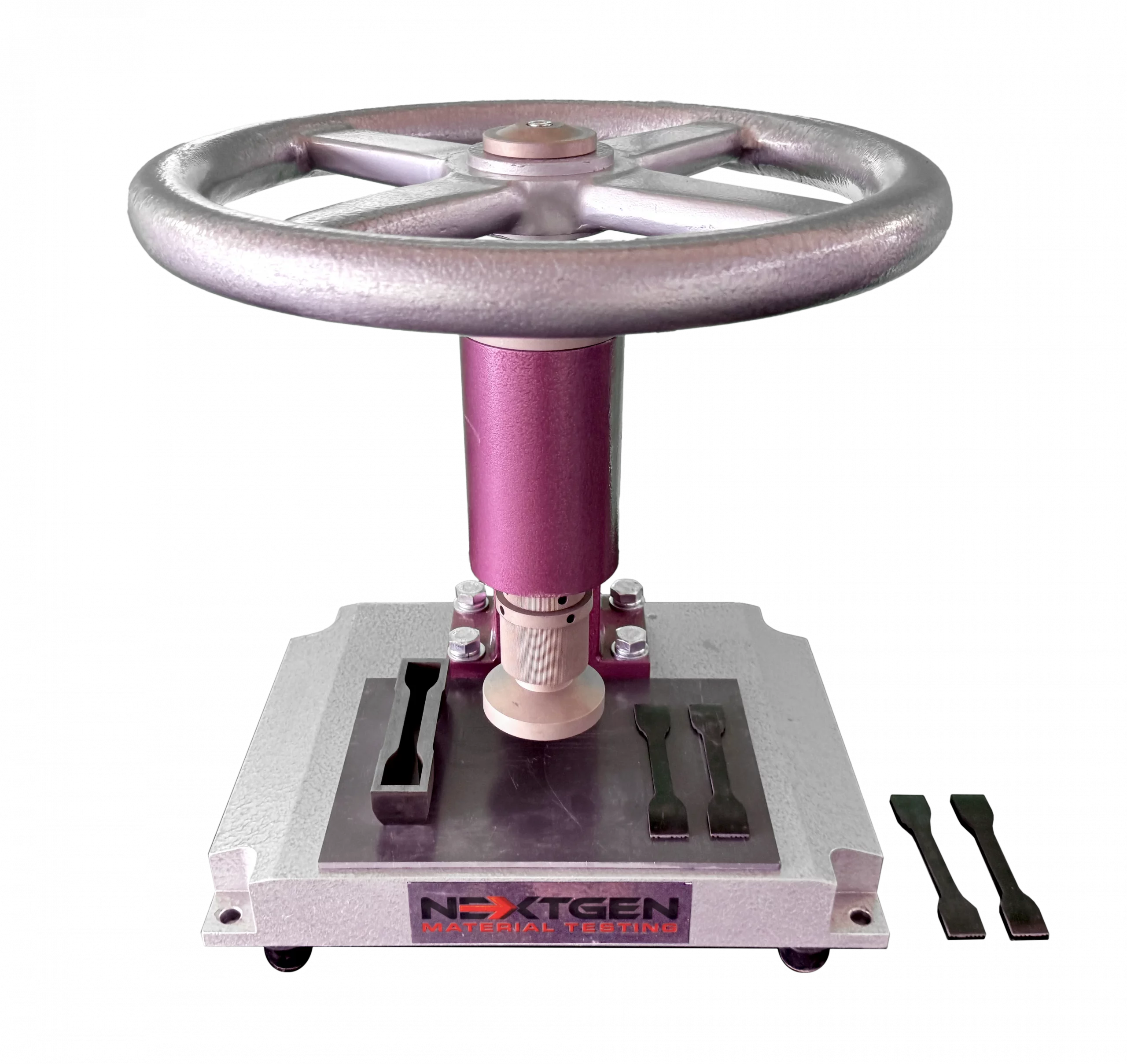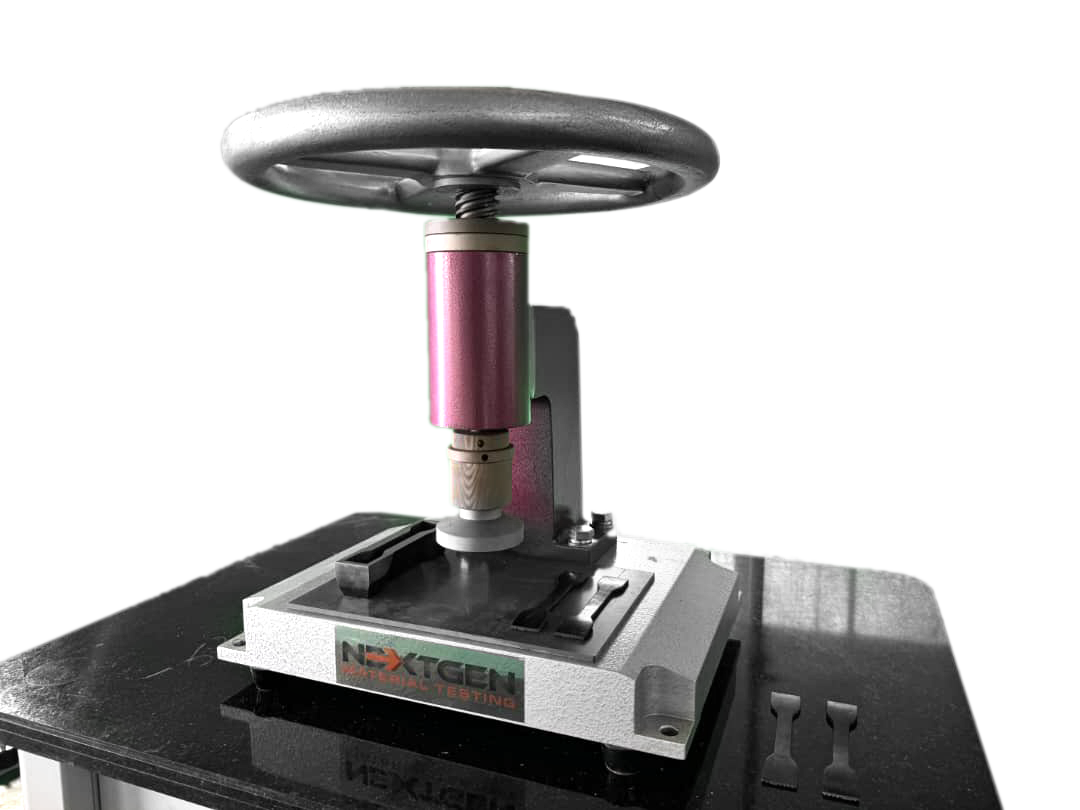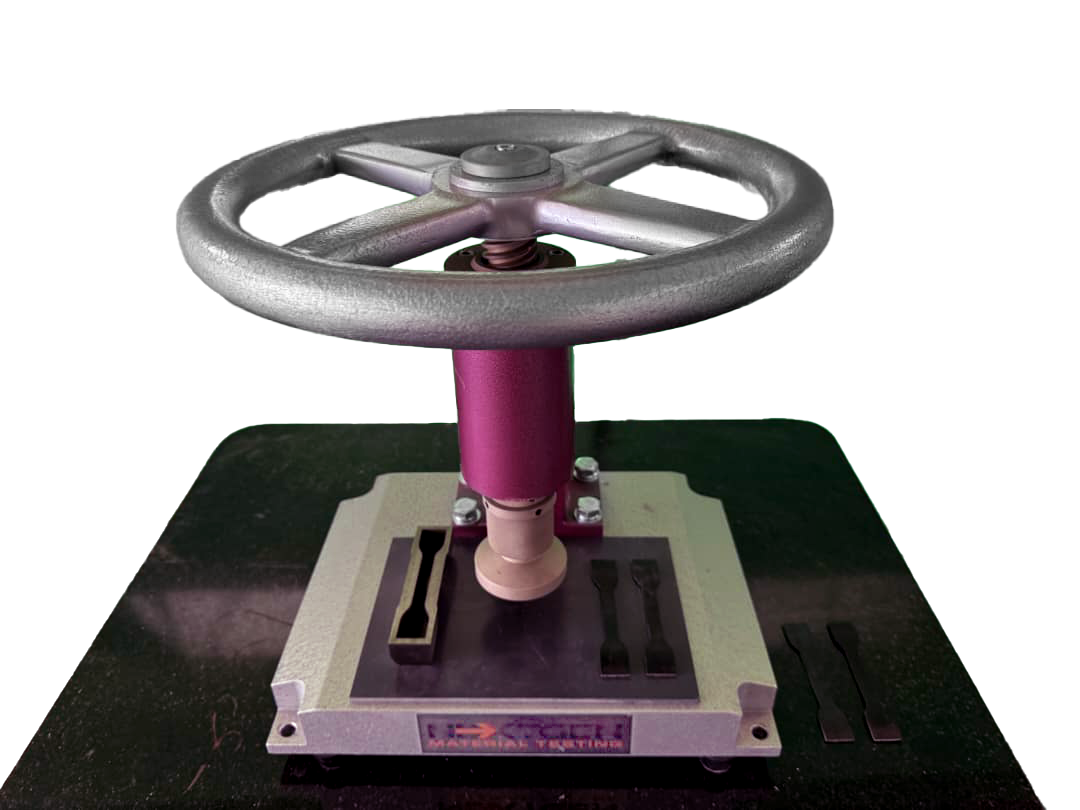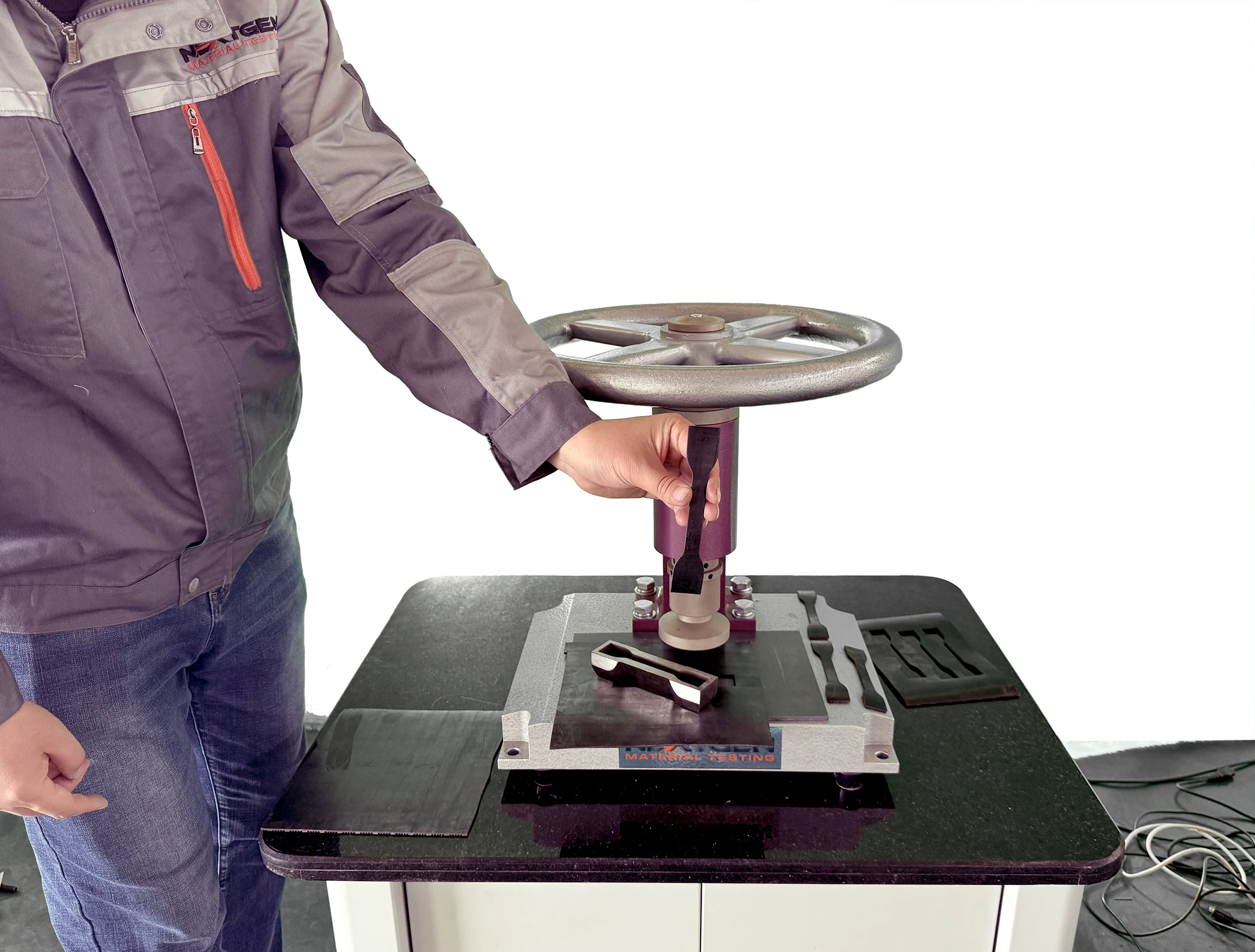Rubber Testing Equipment
Standards
ASTM D412, ASTM E8, ASTM B557, ASTM A370






Description
Our newest manual cutting press system is suitable for laboratories to create specimens from rubber, tape, and special materials. It can function as a compact presser, characterized by its simple structure, easy operation, and virtually no noise.
Manual Cutting Press System Technical Specifications
| NG-T-Press M Series EML102 | |
| Max. punching force | 30kN |
| Puncture stroke | 25mm |
| Diameter of punching head | 84mm |
| Dimensions | 19.70" x 15.75" x 19.70" / 500 x 400 x 400mm |
| Weight | 187lbs / 85kg |
| Cutting knife | Optional, complies with ASTM E8, ASTM B557, ASTM A370, ASTM D412, and more |
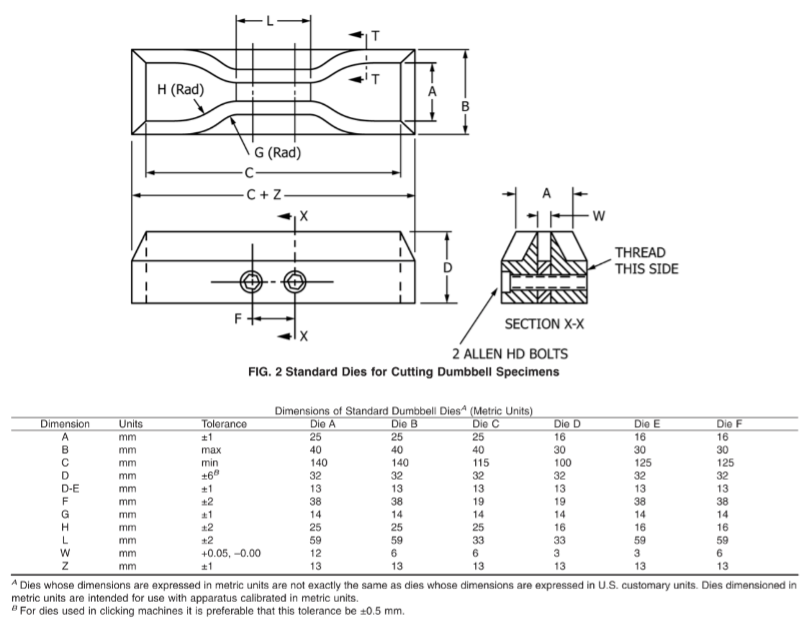
Technical Chart
Note: Additional ASTM D412 knives with Die B, C, D, E and F are available on request
FAQs
Yes, the NG-T-Press M Series Manual Cutting Press System is designed to comply with ASTM D412, which is the standard test method for vulcanized rubber and thermoplastic elastomers-tension. This standard is important for laboratories testing the tensile properties of rubber, tape, and special materials. It provides guidelines for the preparation of test specimens and the determination of tensile properties such as elongation, tensile strength, and stress at a given elongation.
The NG-T-Press M Series features a cutting knife option that specifically meets ASTM D412 requirements, making sure that specimens are cut to the precise dimensions required by the standard. This compatibility with ASTM D412 enables laboratories to prepare accurate and consistent specimens, facilitating reliable tensile testing. The precision and compliance provided by the NG-T-Press M Series make it an invaluable tool for quality control, research and development, and compliance testing in industries using rubber and similar materials.
Click here to learn more about the product or here to receive a personalized quote.
Yes, the NG-T-Press M Series Manual Cutting Press System is specifically designed to meet ASTM E8 specifications, which is the standard test method for tension testing of metallic materials. This standard outlines the proper dimensions and preparation procedures for test specimens to ensure accurate and consistent tensile testing results. The cutting press system features an optional cutting knife that complies with ASTM E8, guaranteeing that metallic specimens are precisely prepared according to the standard's requirements.
The compatibility with ASTM E8 makes the NG-T-Press M Series particularly valuable for laboratories involved in metallurgical research, quality control, and product testing. By using this manual cutting press, facilities can efficiently prepare specimens with the exact dimensions needed for tension tests, helping to maintain high standards of accuracy and reliability in their testing processes. The compliance with ASTM E8 increases the usefulness of the NG-T-Press M Series in a wide range of industrial and research applications where metallic materials are evaluated.
Click here to learn more about the product or here to receive a personalized quote.
Yes, the NG-T-Press M Series Manual Cutting Press System is designed to comply with ASTM B557, the standard test method for tension testing aluminum- and magnesium-alloy products. The use of this standard guarantees that the specimens used in the testing of aluminum and magnesium alloys have been prepared in a manner that ensures that properties like tensile strength, yield strength, and elongation can be measured correctly.
It should be noted that the system includes an optional cutting knife that can also be used to prepare specimens in compliance with ASTM B557 requirements. As a result, the specimens' dimensions and condition are guaranteed to meet the requirements of the standard, enabling reliable and consistent testing results to be obtained. Compatibility with ASTM B557 makes the NG-T-Press M Series a valuable tool for laboratories engaged in testing and analyzing aluminum and magnesium alloy mechanical properties.
Click here to learn more about the product or here to receive a personalized quote.
Yes, the NG-T-Press M Series Manual Cutting Press System is fully compatible with ASTM A370, which covers standard test methods and definitions for the mechanical testing of steel products. This standard specifies the requirements for preparing specimens for tension tests and other mechanical tests on steel products. The manual cutting press system offers an optional cutting knife designed to create specimens that meet ASTM A370 specifications.
Due to this compatibility, steel specimens can be prepared accurately and efficiently to test important properties such as tensile strength, yield strength, and elongation in an efficient and accurate manner. The NG-T-Press M Series complies with ASTM A370 in order to guarantee that it is a reliable tool for quality control and material certification in laboratories and manufacturing facilities, especially in industries where steel is a significant component.
Click here to learn more about the product or here to receive a personalized quote.
The NG-T-Press M Series Manual Cutting Press System is specially designed to create test specimens from different types of materials, making it an ideal choice for laboratories engaged in diverse testing activities. Specifically, this manual cutting press system is suitable for handling rubber, tape, and other special materials that require precise dimensional cutting for testing purposes.
This adaptability allows laboratories to use the same system for multiple types of materials, streamlining the preparation process for tensile and other mechanical tests. Whether the task involves cutting standard rubber samples for tensile strength tests or preparing tape and other special materials for product development and quality assurance, the NG-T-Press M Series provides the necessary precision and ease of use. This capability guarantees that laboratories can maintain high standards of accuracy and efficiency in their testing processes, making the NG-T-Press M Series a valuable asset in any material testing setting.
Click here to learn more about the product or here to receive a personalized quote.
The NG-T-Press M Series Manual Cutting Press System is designed to function as a compact presser, offering several key features that enhance its usability and efficiency in laboratory settings. Notably, the system is characterized by its simple structure, which facilitates straightforward operation without extensive training or technical knowledge. This simplicity is a must for labs that need to conduct frequent testing with minimal setup time.
Additionally, the press system operates with virtually no noise, making it an excellent choice for environments where maintaining a quiet workspace is necessary. This feature is notably beneficial in shared spaces or small laboratories where excessive noise can be disruptive.
The compact design of the NG-T-Press M Series saves valuable laboratory space and also provides an efficient and user-friendly solution for preparing test specimens from rubber, tape, and special materials. Its ease of use and quiet operation make it an ideal tool for any laboratory focused on material testing and quality control.
Click here to learn more about the product or here to receive a personalized quote.
The NG-T-Press M Series EML102 Manual Cutting Press System is equipped with a maximum punching force of 30 kN (kilonewtons). This substantial force capacity enables the system to handle an array of materials, including rubber, tape, and other specialized substances that require precise cutting to form test specimens. The 30 kN force means that the press can efficiently and effectively cut through these materials with precision, making it ideal for preparing specimens that need to meet specific testing standards such as ASTM D412, ASTM E8, and others.
This high level of punching force also allows laboratories to make use of the NG-T-Press M Series EML102 for more demanding applications, where robust and consistent cutting power is essential to achieve accurate test results. The combination of power, precision, and flexibility makes this model a valuable asset in any laboratory conducting material strength and compliance testing.
Click here to learn more about the product or here to receive a personalized quote.
The NG-T-Press M Series EML102 Manual Cutting Press System features a puncture stroke capacity of 25 mm. This specification indicates the maximum distance the cutting head or punch can travel during operation. A 25 mm stroke capacity is sufficient for a broad range of cutting tasks, particularly for preparing tensile specimens from materials such as rubber and tape. It is here that precision depth and control are crucial to guaranteeing sample quality and consistency.
The puncture stroke capacity increases the system’s versatility, allowing it to handle various thicknesses and types of materials effectively. This capability makes sure that the cutting process is not only accurate but also adaptable to different testing requirements, supporting the preparation of specimens that must meet stringent industry standards. The 25 mm stroke is particularly beneficial in labs where multiple material types are tested, providing the flexibility to switch between different specimen preparation tasks quickly and easily.
Click here to learn more about the product or here to receive a personalized quote.
The NG-T-Press M Series EML102 Manual Cutting Press System is equipped with a punching head with a diameter of 84 mm. This sizeable punching head allows for the handling of a huge variety of specimen sizes, particularly beneficial for cutting larger samples efficiently and accurately. The 84 mm diameter means that the system can accommodate different material types and thicknesses, making it ideal for laboratories with diverse testing requirements.
It is especially useful when it comes to preparing standard test specimens for tension and compression tests, where consistency in sample size and shape is critical for the reliability of testing results. A substantial diameter of the punching head makes it easier to produce specimens that are uniform in shape, contributing to the accuracy and repeatability of the test results across multiple samples as a result of the work of the punching head.
Click here to learn more about the product or here to receive a personalized quote.
The NG-T-Press M Series EML102 Manual Cutting Press System has compact dimensions measuring 19.70 inches (500 mm) in height, 15.75 inches (400 mm) in width, and 19.70 inches (500 mm) in depth. Because of these dimensions, the manual cutting press is both space-efficient and easy to install in different laboratory settings, including those with a limited amount of space.
The compact size of the NG-T-Press M Series EML102 contributes to its versatility, allowing it to be placed on standard laboratory benches or moved around as needed without significant physical effort or space adjustments. This size efficiency does not compromise the machine's functionality or capability to work with a wide range of materials and specimen sizes, making it an ideal choice for laboratories seeking a powerful yet space-conscious cutting press solution.
Click here to learn more about the product or here to receive a personalized quote.
The NG-T-Press M Series EML102 Manual Cutting Press System weighs approximately 187 pounds, or 85 kilograms. This robust weight contributes to the stability of the press during operation, making sure it remains steady and secure while handling different materials. The substantial weight is ideal for maintaining precision during the cutting process, as it helps to prevent any movement that could lead to inaccuracies in specimen dimensions.
It is important to note that in spite of its solid construction, the weight of this device can still be managed in a laboratory environment. The advantage of this approach is that it allows for relatively easy relocation within the workspace if necessary. This balance between stability and maneuverability makes the NG-T-Press M Series EML102 a practical choice for laboratories looking for a durable and reliable manual cutting press system.
Click here to learn more about the product or here to receive a personalized quote.
Yes, the NG-T-Press M Series EML102 Manual Cutting Press System offers optional cutting knives compliant with a variety of ASTM standards, including ASTM E8, ASTM B557, ASTM A370, and ASTM D412. These knives are designed to meet the specific requirements for cutting test specimens from different materials such as metals and rubber. As a result, specimens are prepared according to the exact standards needed for reliable testing.
Additionally, there is an option to request specialized cutting knives for ASTM D412 with Die B, C, D, E, and F. These additional knives provide greater flexibility and precision for preparing rubber tensile specimens, accommodating different shapes and sizes as dictated by the standard. This capability enhances the utility of the NG-T-Press M Series EML102, making it a valuable tool for laboratories conducting different types of material tests and needing to meet strict industry standards compliance.
Click here to learn more about the product or here to receive a personalized quote.
Related Products
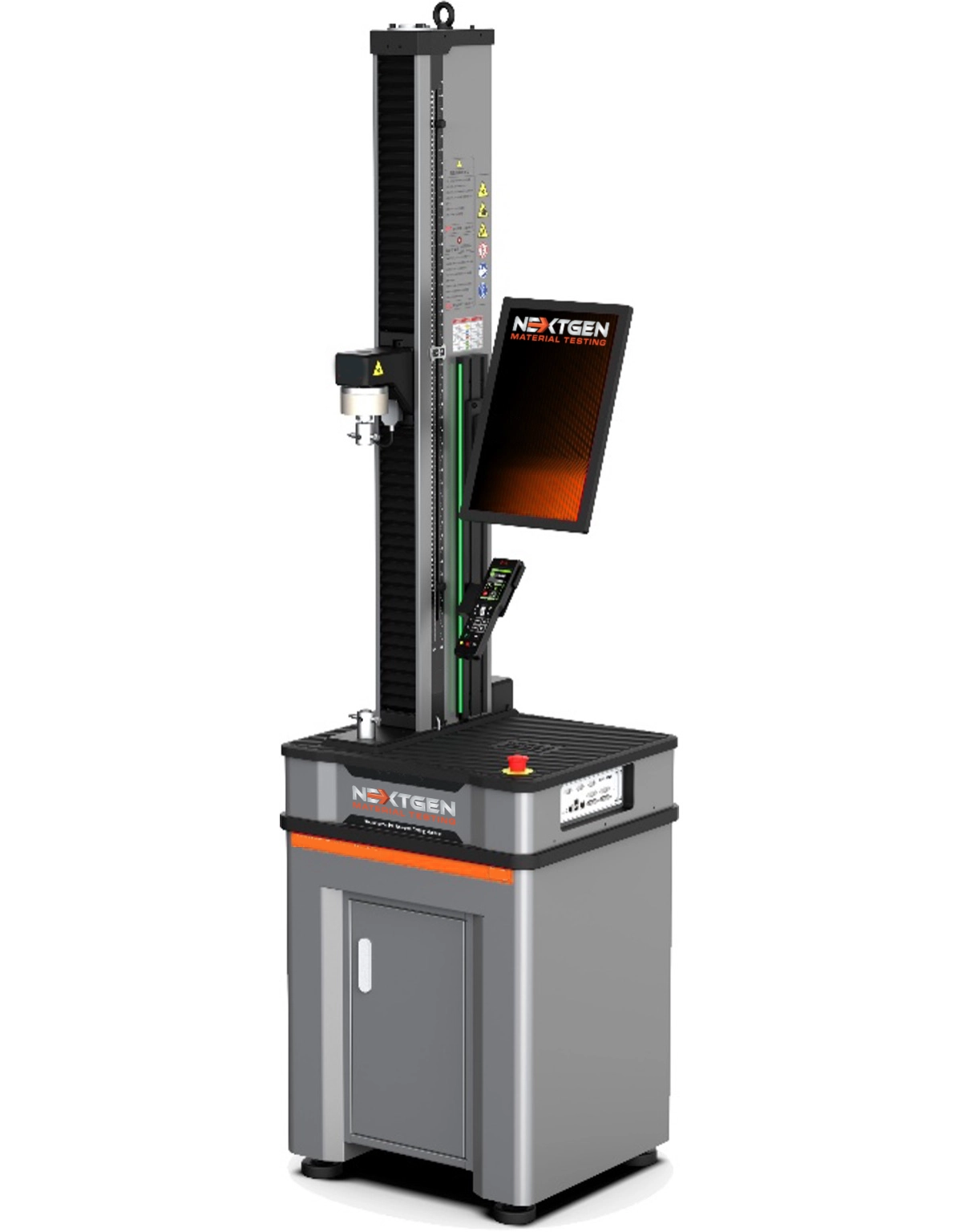
NG-EML Series A – Single Column Bench Top Universal Testing Machine (50 N – 5 kN)
The NG-EML Series A – Single Column Bench Top UTM (50 N–5 kN) is a precision electromechanical system designed for tension, compression, and flexural testing of low-force specimens. Featuring GenTest™ software, a high-speed servo drive, Class 0.5 accuracy, and USB/Ethernet control, this compact tabletop unit supports ASTM, ISO, and EN standards. Ideal for testing plastics, rubber, foams, films, composites, and thin metals.
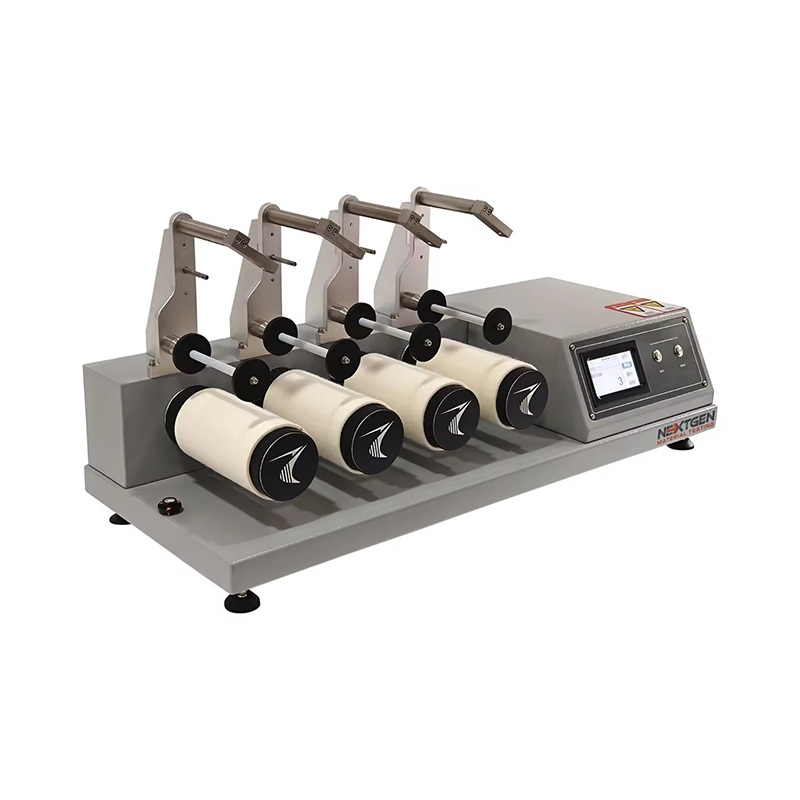
ICI / Mace Snag Tester
Discover the Fabric Textile ICI / Mace Snag Tester, a reliable tool for assessing fabric snagging under normal wear conditions.
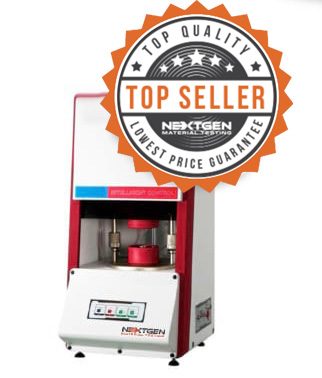
Moving Die Rheometer (MDR)
Introducing the NG-MDR Moving Die Rheometer, your solution for accurately assessing the curing and processing characteristics of vulcanized rubber compounds. Designed for precision, this state-of-the-art rheometer captures the characteristic curve and parameters of rubber vulcanization by measuring the torque applied to the oscillating die.
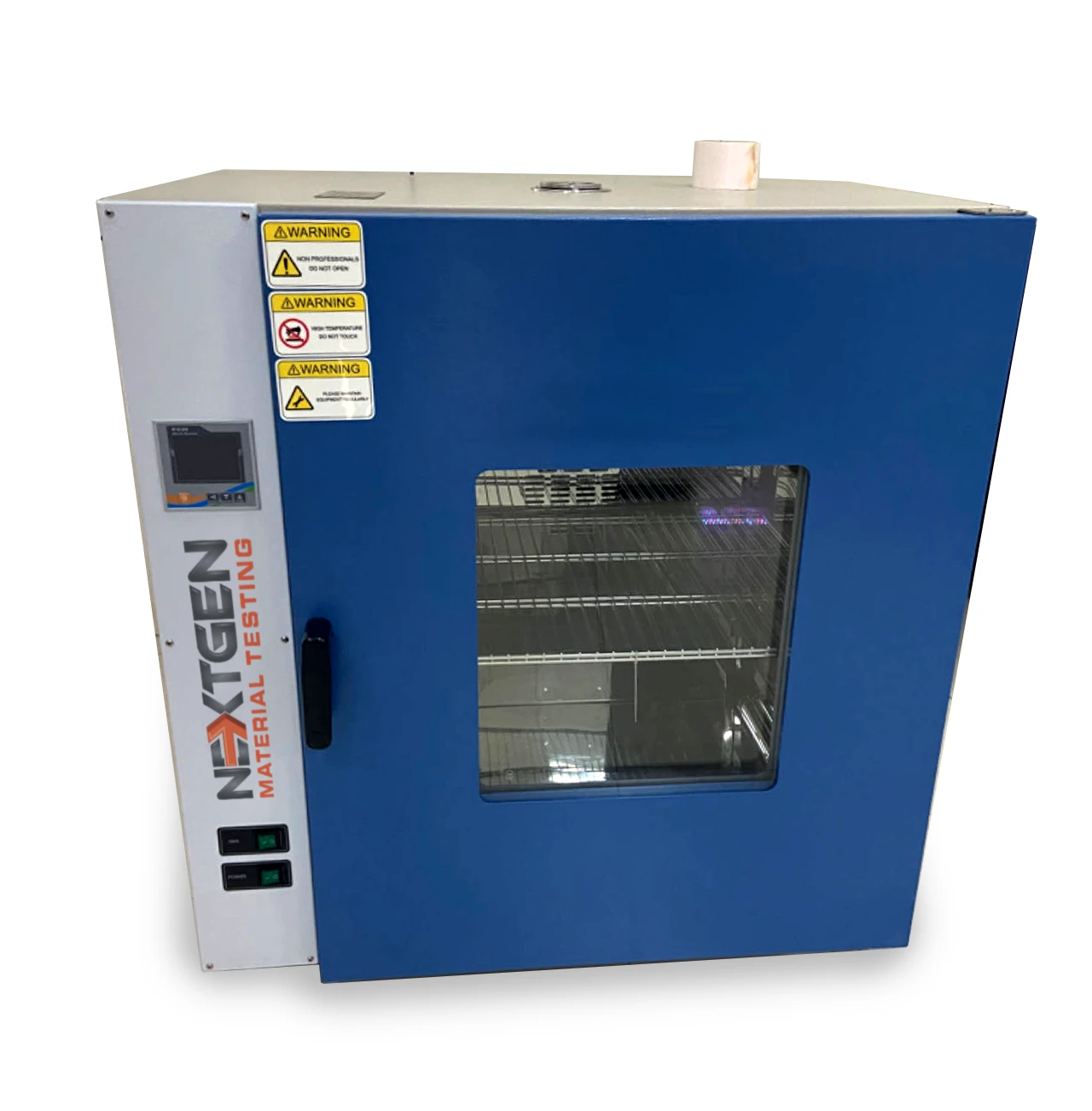
Aging Oven – High-Temperature Chamber – NG-AGOV-ADV
The NG-AGOV-ADV Aging Oven is designed for high-temperature testing of rubber, plastics, and insulating materials. It features programmable PID control, uniform airflow, and forced convection for stable and repeatable aging cycles. This system supports global testing standards including ISO 188, ASTM D573, and IEC 60216-4-1. With its durable stainless-steel chamber and user-friendly interface, it’s ideal for R&D, quality control, and certification labs.
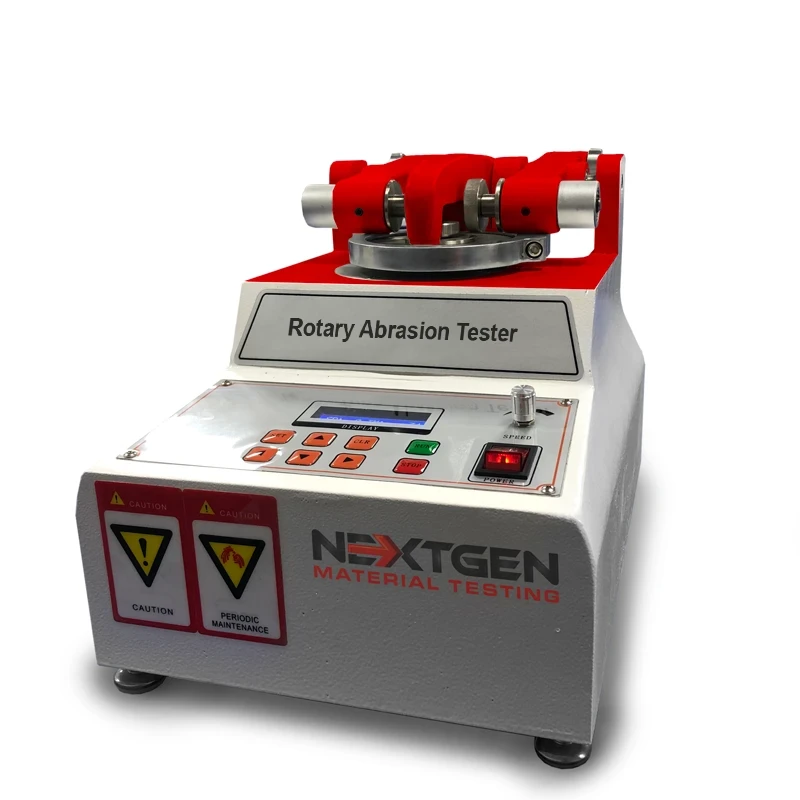
Rotary Abrasion Tester Single & Dual Wheel
GenRotary used evaluate abrasion resistance. It can conduct tests on a wide range of materials such as: cloth, paper, paint, plywood, leather, tile, glass, rubber etc. It tests the specimen by rotating it while in contact with the grinding wheel and applying the required pressure. The Joss of weight reflects on the change in weight of the specimen. The unit also has an intelligent power failure recovery function.
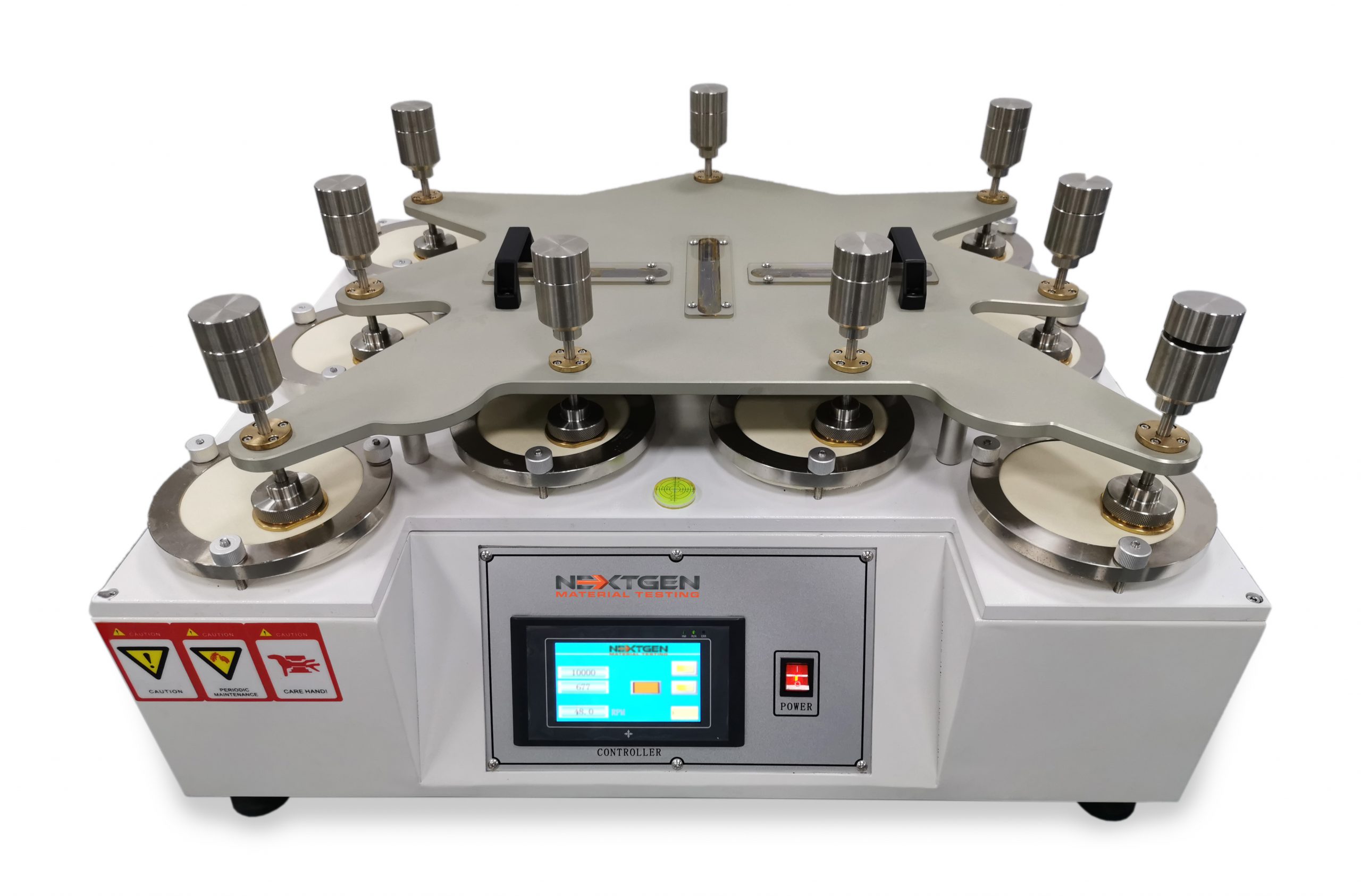
9-Station Martindale Abrasion Tester
The GenDale - Martindale Abrasion Tester is mainly used to test shoe fabric, shoe lining, and many other types of shoe related materials.
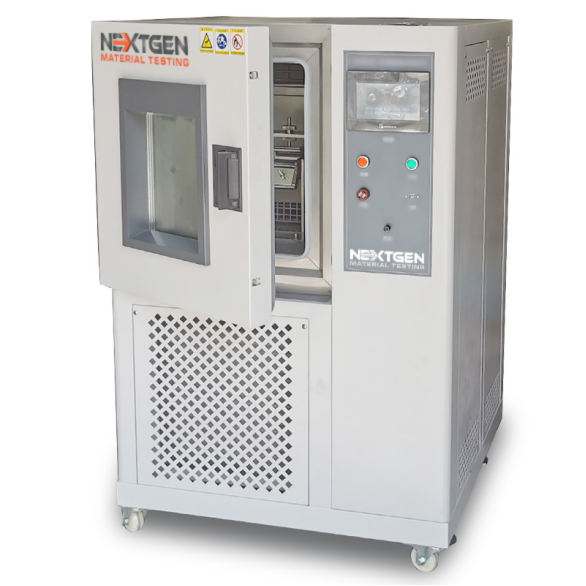
GenRoss-CH - Ross Flex Tester with Low Temperature Chamber
GenRoss-CH is an advanced Ross Flex Tester designed for assessing the cold resistance of materials in low temperature environments.

Linear Abrasion Tester
NextGen's linear abrasion meters evaluate the abrasion and scratch resistance of products, along with color transmission.
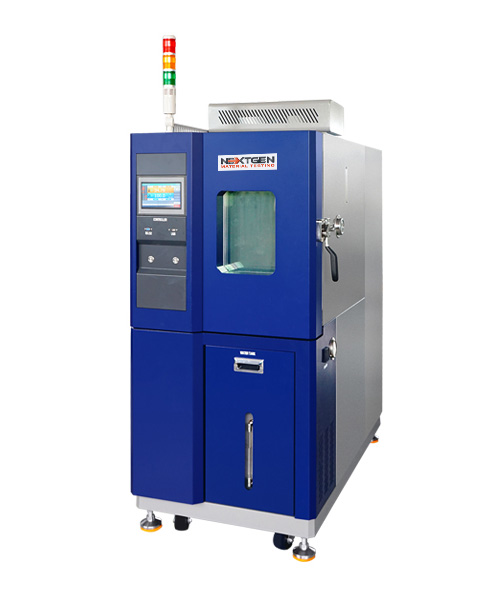
NextGen Environmental Chambers NG-EC 100,150,225,408,1000
The temperature and humidity NextGen Environmental Chambers features a sturdy cabinet made of cold-rolled steel and stainless steel.
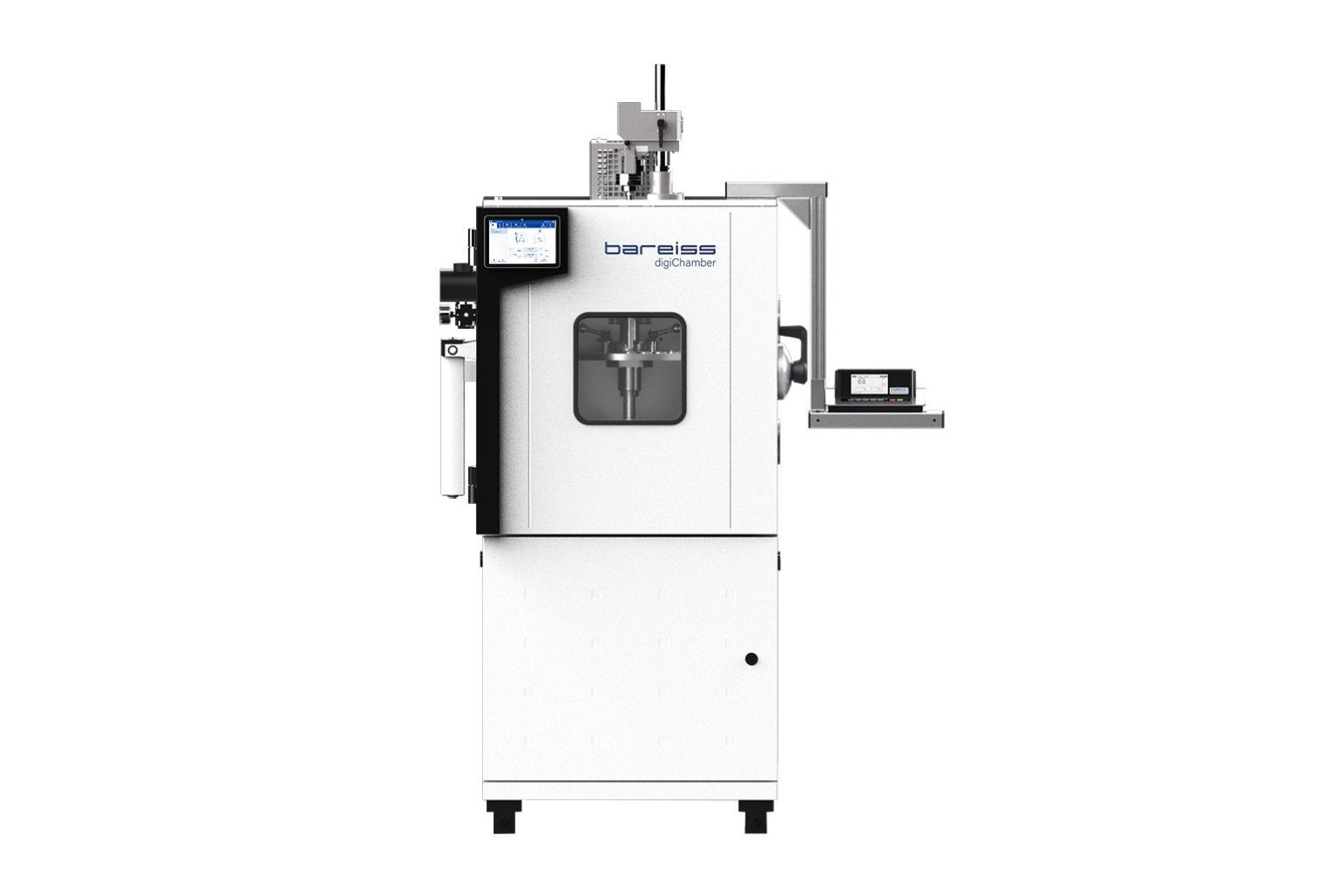
digiChamber - Temperature Controlled Hardness Testing
Discover digiChamber from NextGen Material Testing, the advanced temperature-controlled hardness tester developed by Bareiss.
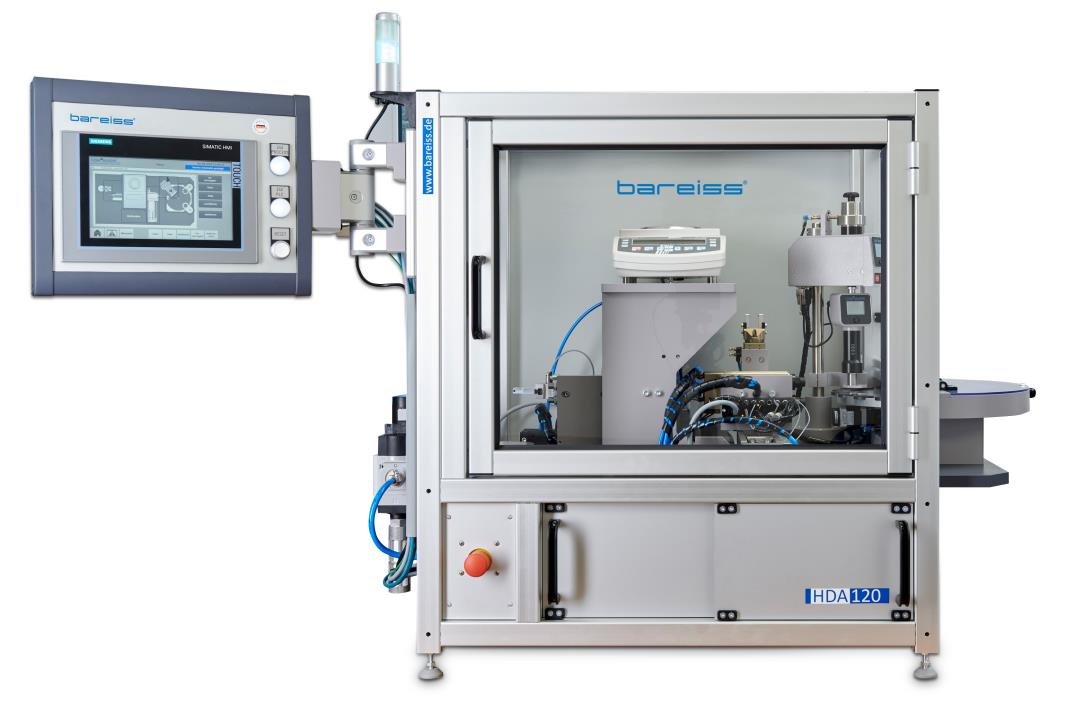
HDA 120 - Hardness and Density Automation Test System
The HDA 120 test system is a versatile solution for semi-automatic detection of sample hardness and density.
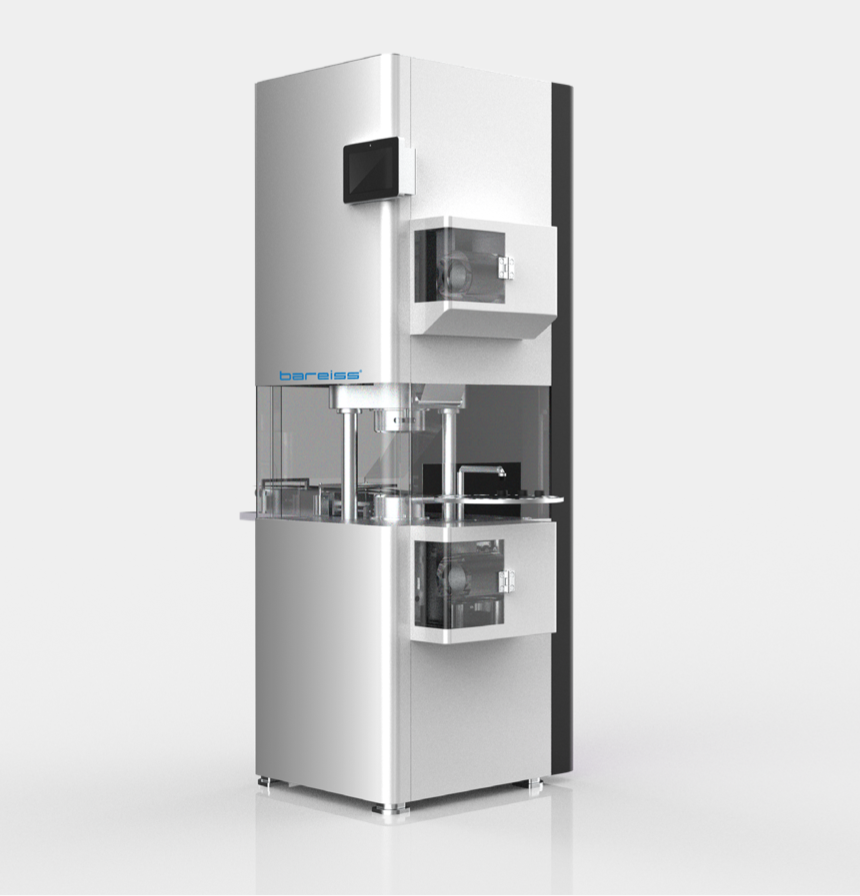
RPA Ultra - Advanced Rubber Process Analyzer Rheometer
RPA Ultra is an advanced rubber process analyzer rheometer that measures the dynamic and static characteristics of raw rubber compounds
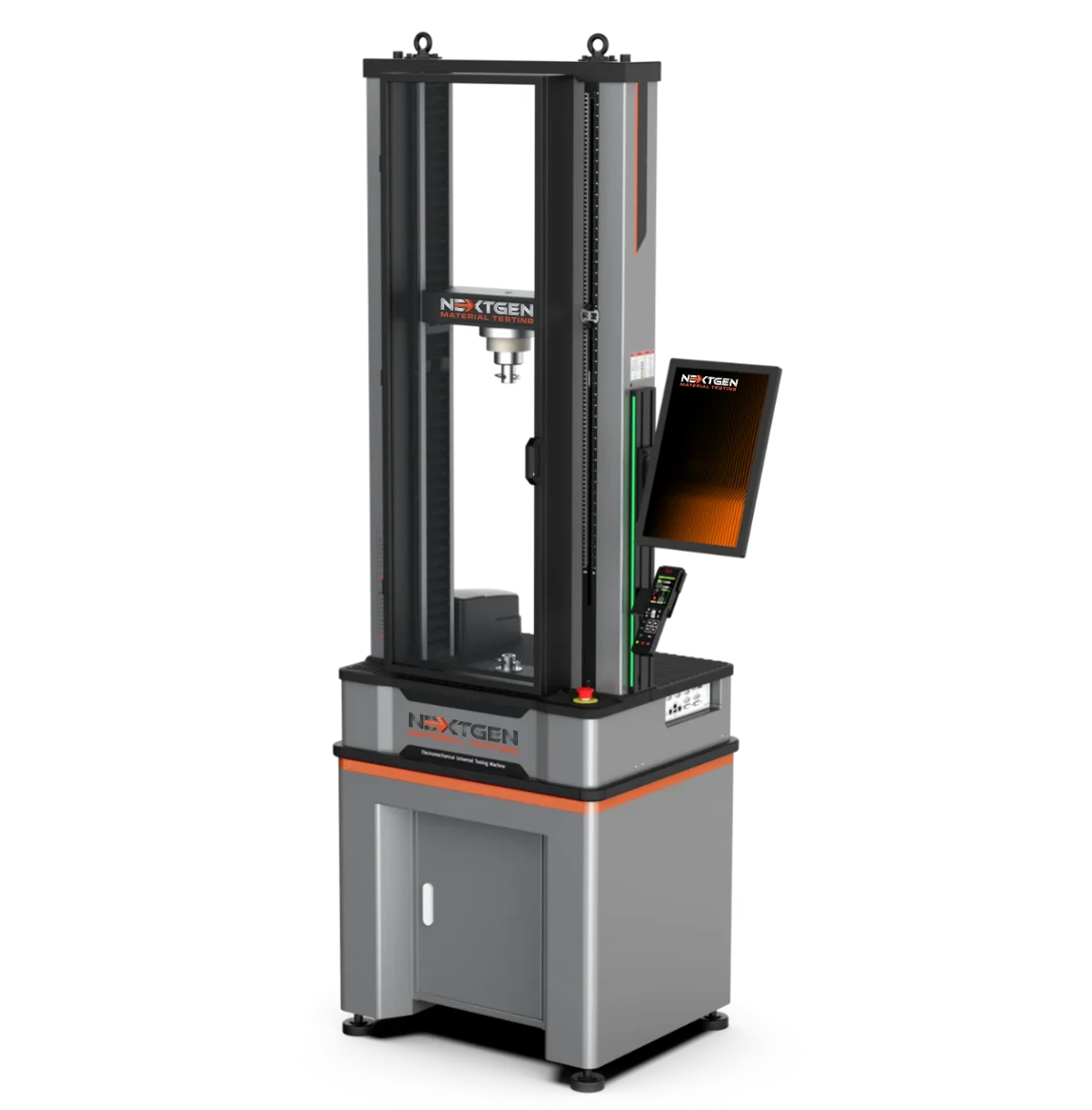
NG-EML Series B – Dual Column Bench Top Universal Testing Machine (100 N – 10 kN)
The NG-EML Series B is a high-precision dual-column benchtop universal testing machine engineered for tensile, compression, and flexural testing in the 0.1 kN to 10 kN range. It features Class 0.5 accuracy, a rigid FEM-optimized frame, and a direct-drive servo system with advanced closed-loop control, making it ideal for testing rubber, plastics, metals, composites, and high-performance polymers in both R&D and quality assurance settings.
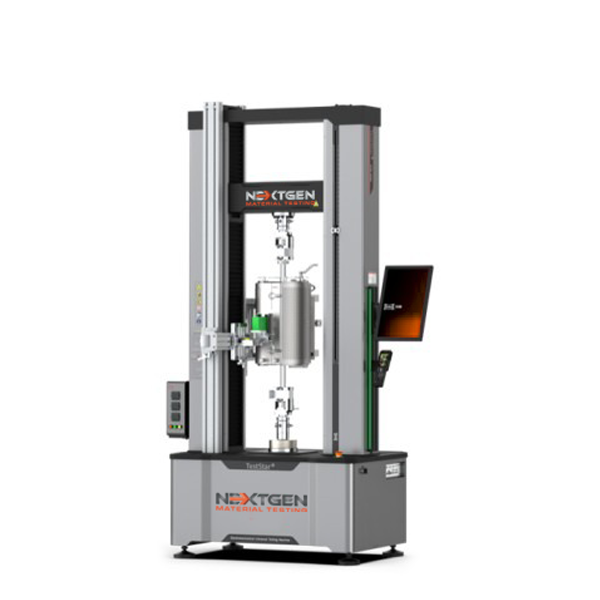
NG-EML Series C – Dual Column Bench Top and Floor Standing Universal Testing Machine (5 kN – 50 kN)
The NG-EML Series C is a precision-engineered dual-column universal testing machine for tension, compression, and flexural testing of metals, composites, rubbers, and polymers. Available in both bench-top and floor-standing formats, with force capacities from 5 kN to 50 kN and Class 0.5 accuracy.
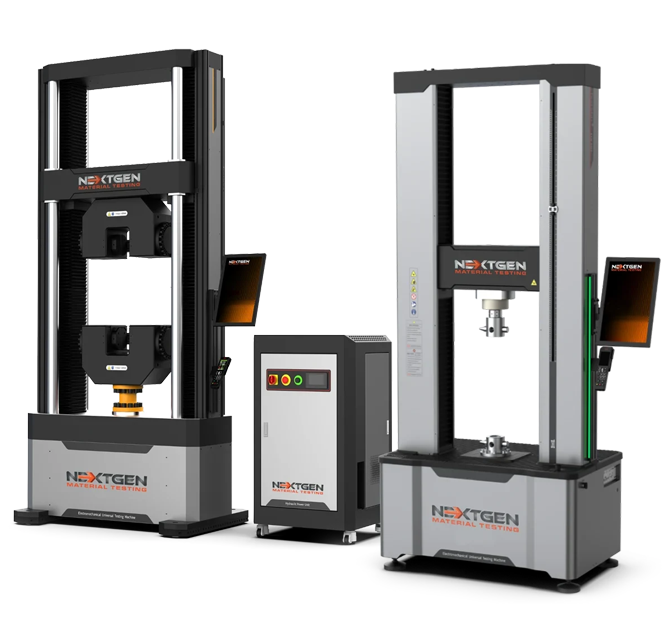
NG-EML Series D – Floor Standing Universal Testing Machine (50 kN – 1000 kN)
The NG-EML Series D – Floor Standing Universal Testing Machine (50 kN–1000 kN) is a dual-column system for tensile, compression, flexural, shear, and cyclic testing of high-strength metals, composites, polymers, and advanced materials. Available in single-space and dual-space configurations, it meets ASTM E8, ISO 6892-1, ISO 527, and GB/T 228 standards. With closed-loop control, 1200 Hz sampling, ultra-low speeds (0.00005 mm/min), and waveform generation, it is ideal for aerospace, automotive, construction, and research labs.
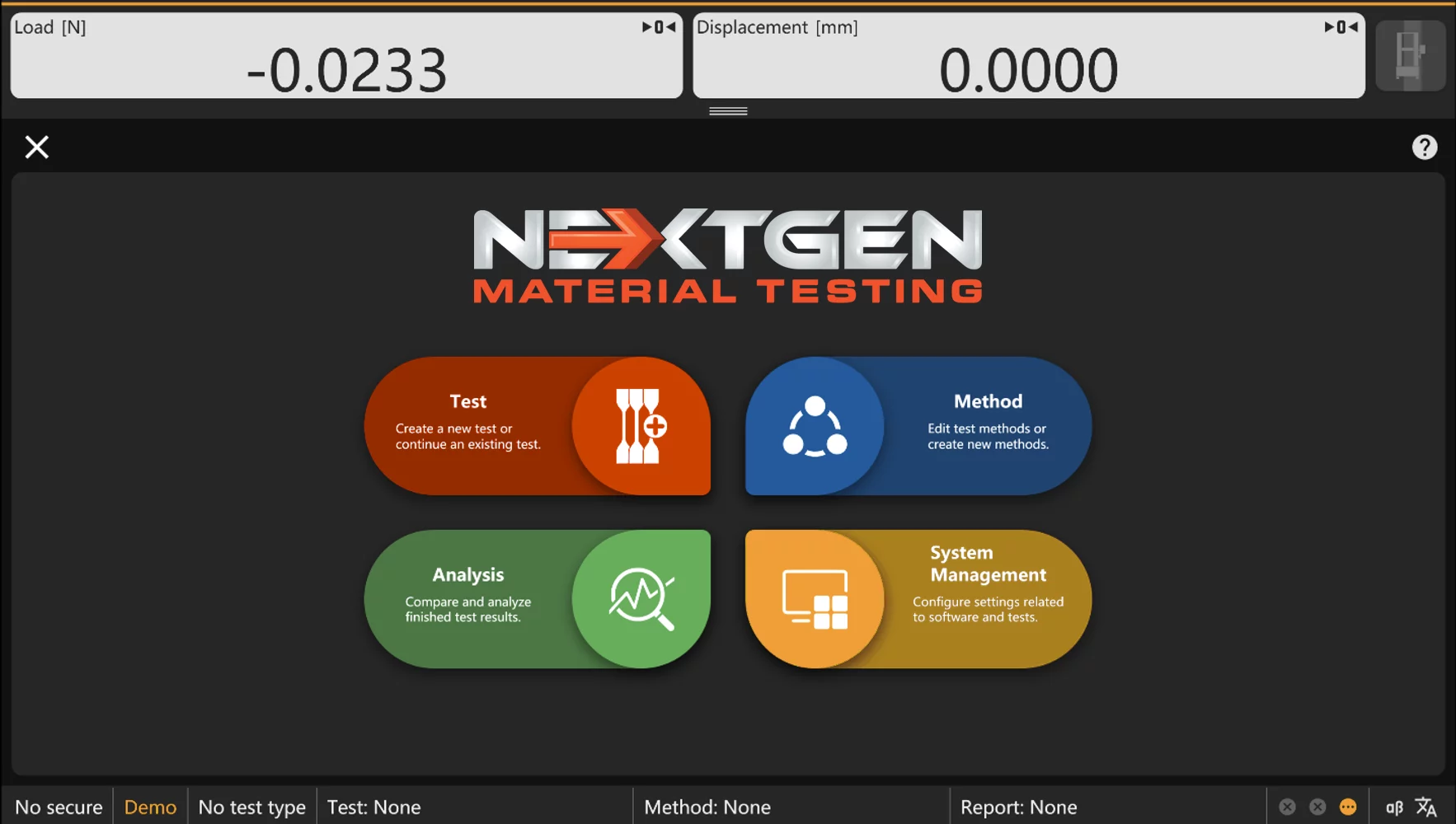
GenTest Data Acquisition Software - Advanced Universal Testing Machine Software
Upgrade to GenTest, the latest data acquisition software for universal testing machines. Ensure precise, repeatable material testing with an intuitive interface, powerful analysis tools, and full compliance with ASTM, ISO, DIN, and more.
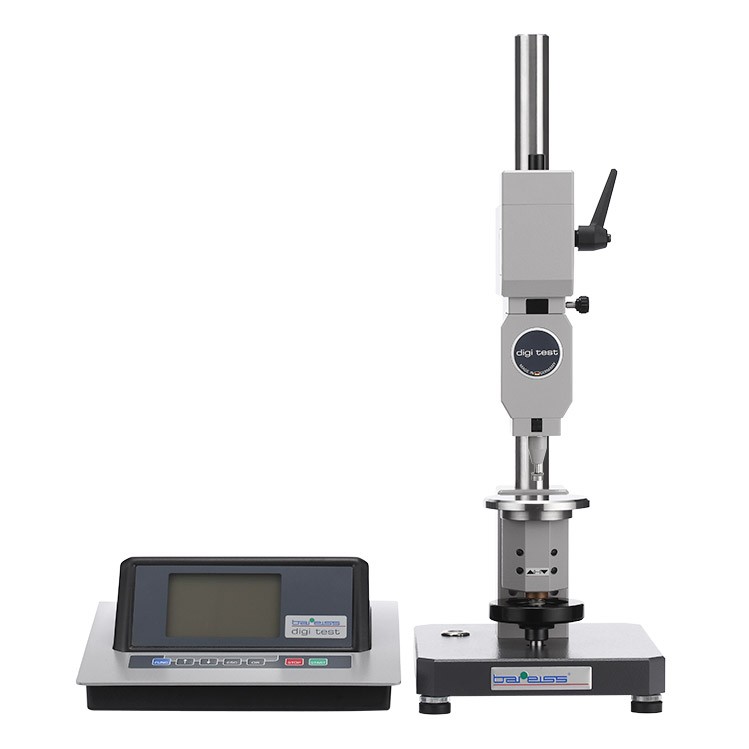
Automatic Shore, IRHD and VLRH Hardness Testing System
NextGen is proud to present our German line of fully-automatic Shore, IRHD and VLRH hardness testing system for plastic materials, plastic and foam compounds for the ultimate precision, accuracy and repeatability, exceptional ease-of-use and maintenance. Experience the industry leader for specimen testing including rubbers, plastics, foams, composites, o-rings, and more.
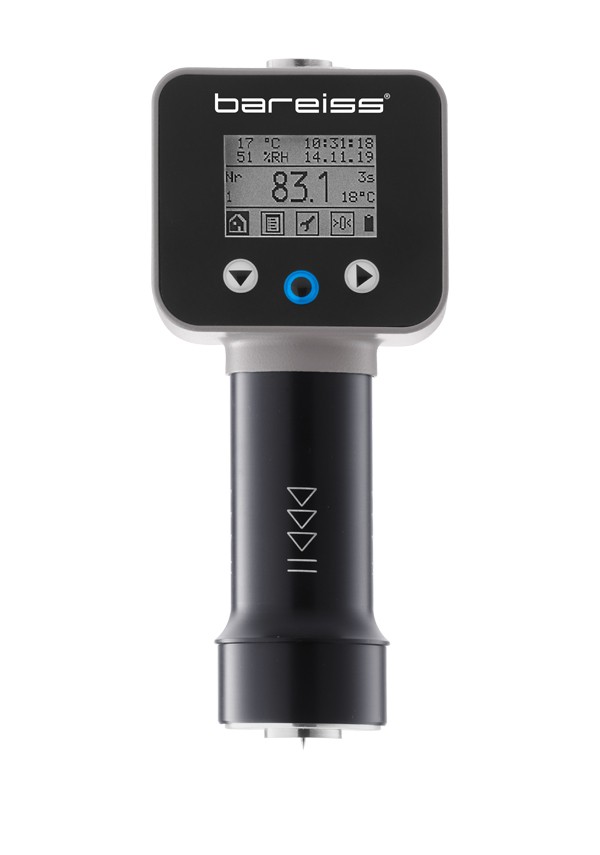
Advanced Portable Shore Durometer System with Test Stand Options
HPEIII is NextGen's advanced German line of equipment that is the new generation of HPE systems ideal for various plastic and plastic compound testing. The new system enhancements offer advantages including temperature sensor, reading values of ambient temperature and humidity, historical hardness value display, larger LCD display, standard USB connection and much more. These advanced portable systems can be paired up with either manual or automatic motorized test stands to help eliminate the human error factor and maximize accuracy and repeatability between test when switching from one operator to the next.
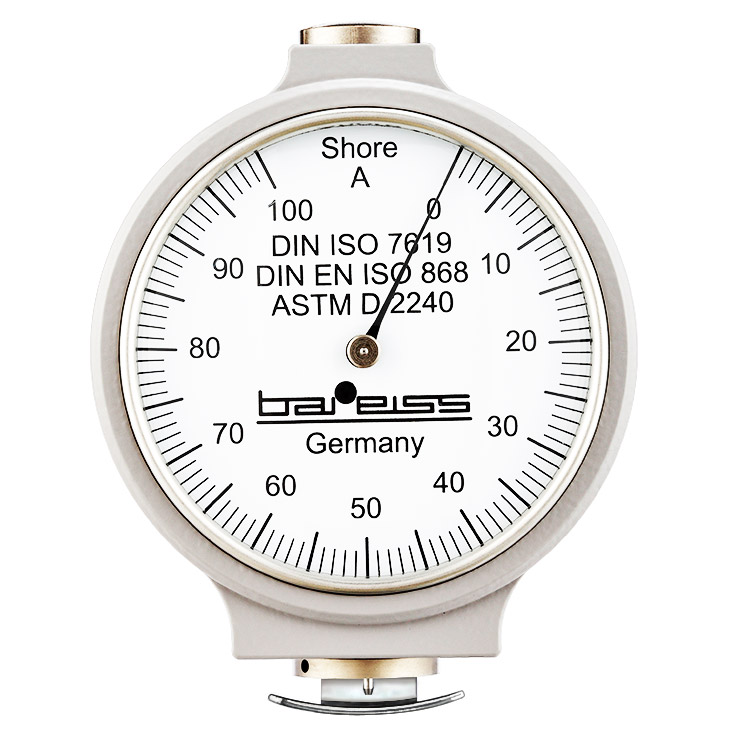
Classic Analogue Shore Durometer with Test Stand Options
This German-manufactured system has been the global benchmark of Shore hardness testing systems since 1954. With ever enhanced ergonomic design, the HP Shore Hardness Tester is both visually appealing and precise rubber and plastic testing system as it has been for nearly 50 years.
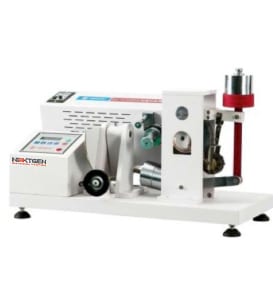
Akron Abrasion Tester
GenKron is used together with a special balance for testing the abrasive consumption of materials. The measurements are done through volumetric loss of a rotating specimen exposed to the action of a standard grinding wheel. It is especially suited for testing harder materials such as shoe soles, tires and other rubber materials.
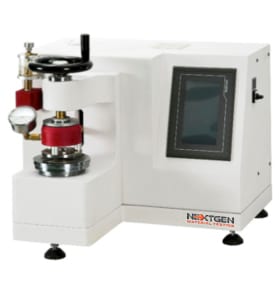
Burst Strength Tester for Fabric
GenBurst is the Burst Strength Tester designed to test anti-rupture strength of variety of materials such as leather, paper and fabric.
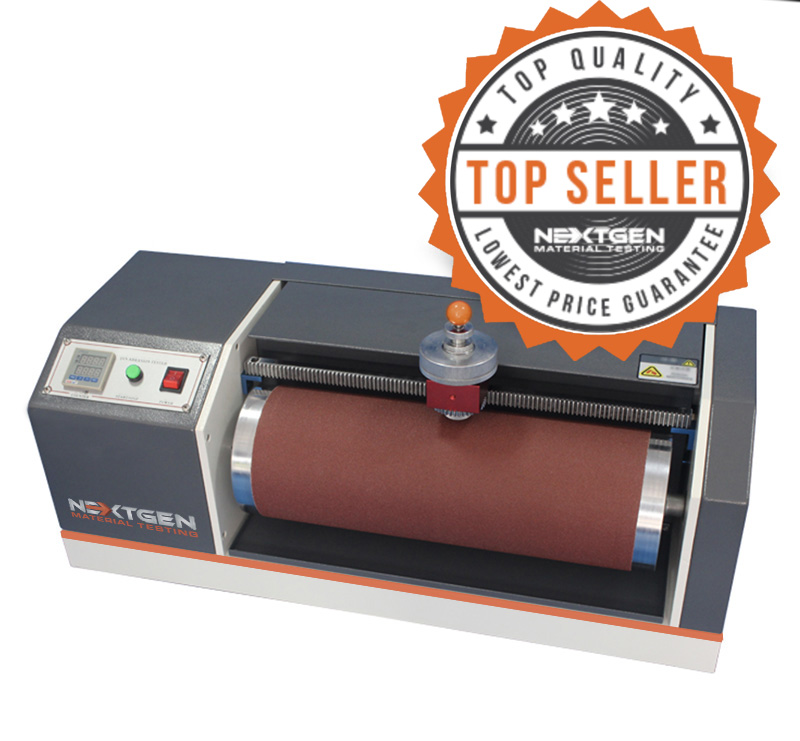
DIN Abrasion Tester
GenDin, is designed to conform to the ASTM D5963 and IS0 4649 standards. This top quality and highly popular abrasion tester will allow you to measure the abrasion resistance of rubbers (vulcanized thermo set rubbers and thermoplastic elastomers) that are subject to abrasive/frictional wear on their actual service. Since wear is always a result of abrasion, different test methods have been developed for the simulation of long term wear.
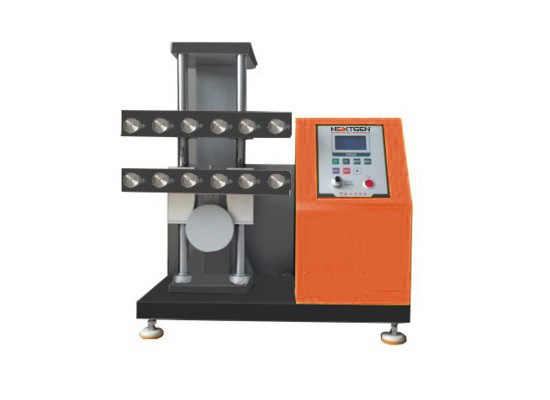
Demattia Flex Cracking Tester
GenFlex tests the ability of rubber products to withstand repeated flexing without developing cracks is of prime importance where such products are used in conditions undergoing repeated flexing. Flexing endurance of rubber products is determined by simulating in laboratory the action of flexing repeatedly under standard conditions of speed, mode, and degree of flexing.
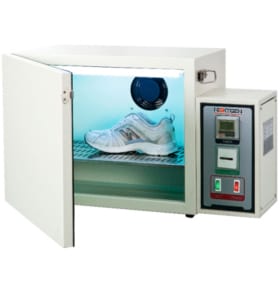
Discoloration Meter
The machine is used to simulate an environment of sunlight radiation on a specimen to identify the resistance of fabric to discoloration.
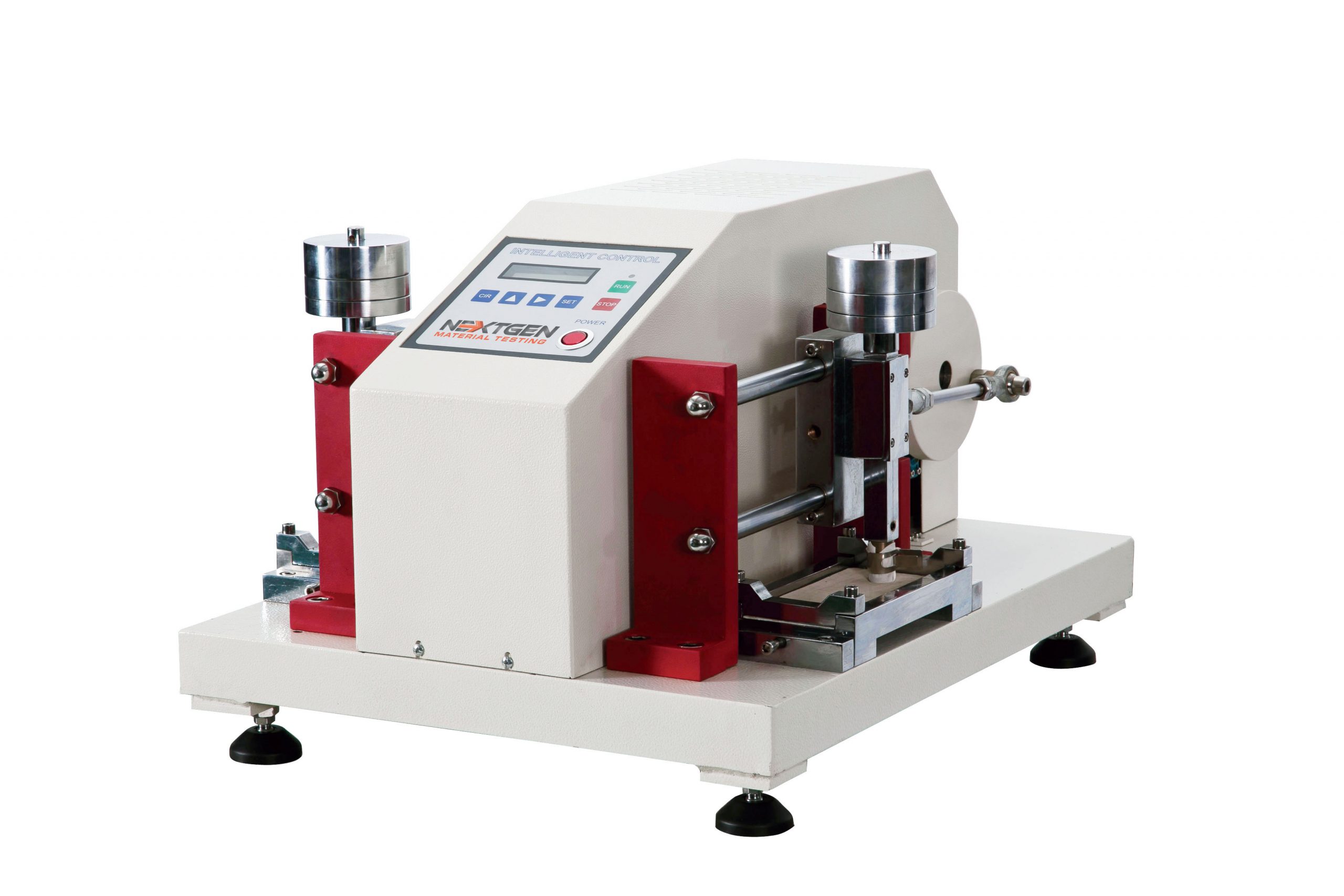
Electric Crocking Tester - GenCrock
The machine is used to test the dyeing of the fabric, and the fade degree of the leather after dry or wet rubbing. The test method involves the specimen to be fastened to the base of the crocking meter and rubbed with an abrasive hammer attached to a wet or a dry cloth under controlled conditions. The transfer of colour is then measured using a scale to evaluate the rating of the specimen's dyeing grade.
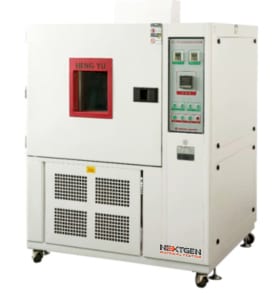
Freezing Tester - GenFreeze
GenFreeze is specially designed to test the characteristics of various materials in a cold environment to ensure suitability for use in a cold climate. Based on the testing demand, adjust the beater and flexing grip, then load to the desired position. It can be used to test rubbers, leather, and plastics, PU leather etc. The unit can be adjusted to meet different requirements.
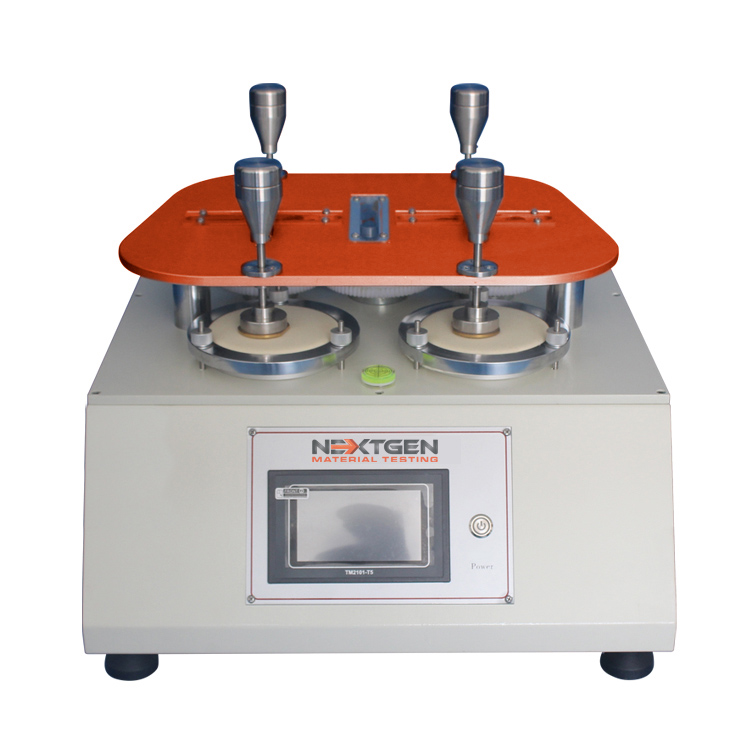
Martindale Abrasion Tester - GenDale
GenDale is mainly used to test shoe fabric, shoe lining, and many other types of shoe related materials. The unit can test up to four specimens at the same time for abrasion. The fabric specimen is measured by having rubbing applied on it via a complex direction of back and forth motion. The accuracy of abrasion strength is determined by the specific number of cycles conducted until a hole appears in the test area of the fabric specimen.
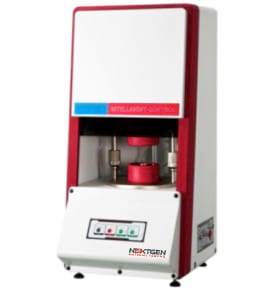
Mooney Viscosity Testing Machine - GenMooney
GenMooney is a viscosity testing machine is applied to measure the viscosity of the unmixed or mixed unvulcanized natural rubber, synthetic rubber and regenerated rubber .This tester has many functions such as fast warming, maintaining temperature, data stability, etc. It is equipped with an automated calibration feature for a simple data calibration of each experiment.
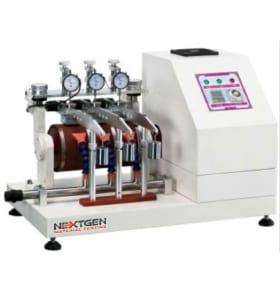
NBS Rubber Abrasion Tester - GenNBS
GenNBS is used to test the abrasion resistance of vulcanized rubber or other rubber compounds. It is commonly used for the soles and heels of footwear. It has an intelligent power failure recovery system. The unit conducts measurements through volumetric loss of specimens exposed to the action of a normalized abrasive medium secured to a rotations cylinder.
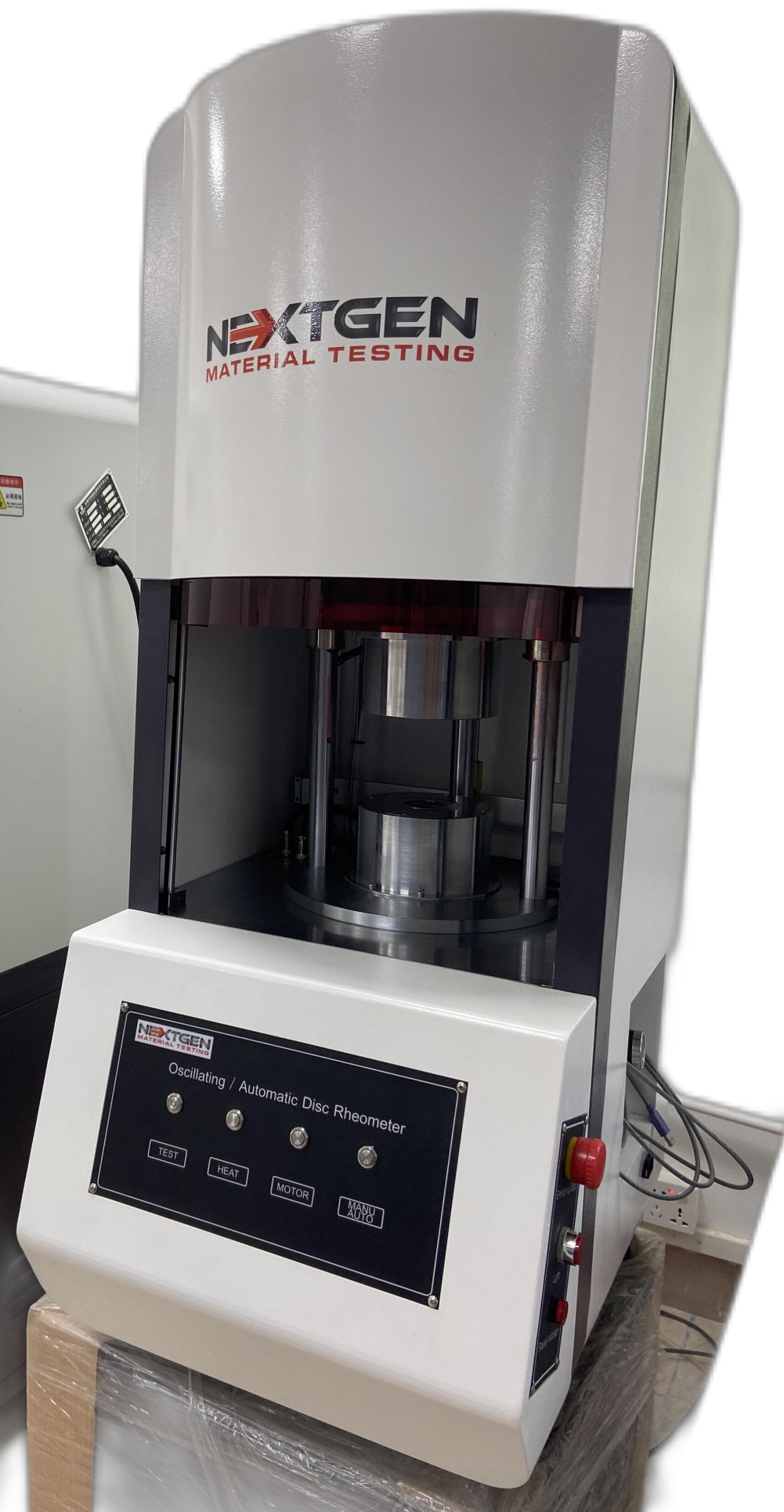
Oscillating / Automatic Disc Rheometer (ODR)
This machine is designed to get the characteristic curve and characteristic parameters of rubber vulcanization by measuring the applied moment of rubber to the oscillating dye body. NG-ODR rotor-free vulcameter has an excellent stability of results. The data and diagrams can be used as a reference for development, research and production quality.
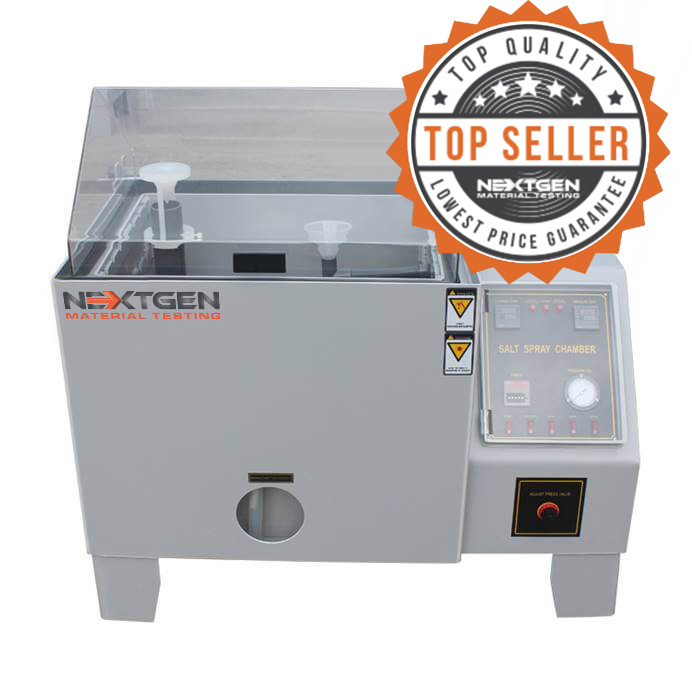
Salt Spray Tester - GenSalt
GenSalt is designed to test the surface of different materials for resistance to corrosion. The unit is commonly used to test coated materials of a metallic nature in a controlled corrosive environment. The test can be used on rust-proof painting, anodizing, electroplating and rust-proof of grease. The machine imitates expedited corrosion process via salt spraying on a given test sample to identify the corrosion (oxides) resistance. Test results are based on the longevity of time a material can resist visible corrosion on the test sample.
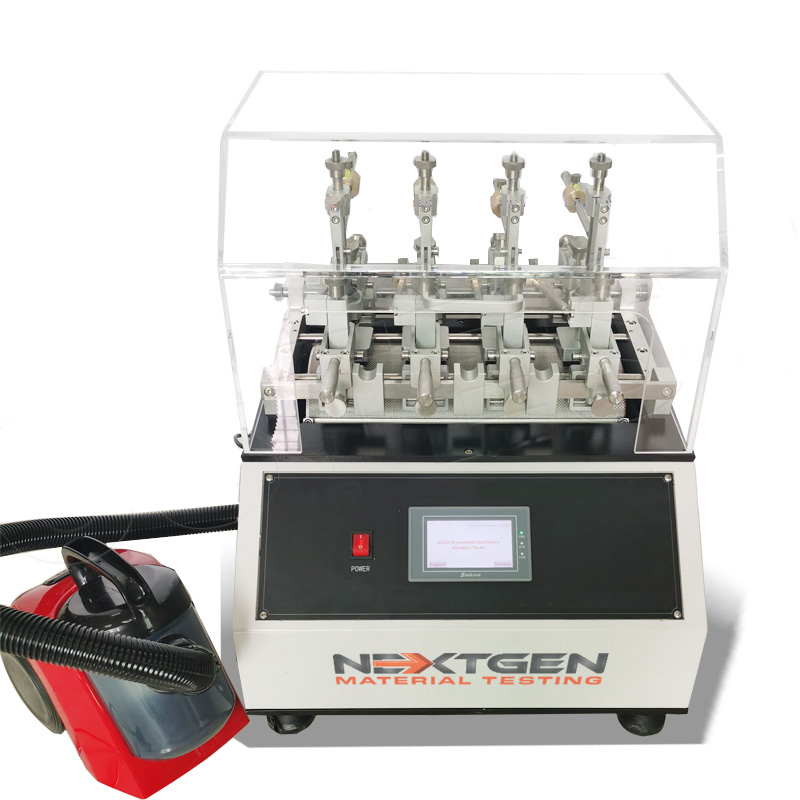
Wyzenbeek Abrasion Tester - GenWyze
The machine is designed to test the abrasion resistance of fabrics and metals. The abrasion of fabrics is tested when the specimen is pulled over the frame and rubbed against an abradant over a curved surface. The number of cycles, also known as double rubs, conducted on the specimen before the fabric shows visible wear is used to determine the rating of abrasion.

Vertical Rebound Resilience Tester - GenRebound
GenRebound tests the resilience of rubber compounds. The machine must be adjusted in a horizontal position and the plunger raised at a specific height. The plunger is then released onto the specimen for a given number of impacts. The measurements are based on the 4th, 5th, and 6th impacts. The average of the three (3) measurements is then calculated for the test result. The machine is highly useful in production of compounds designed to absorb vibration or shock according to the ASTM standards.
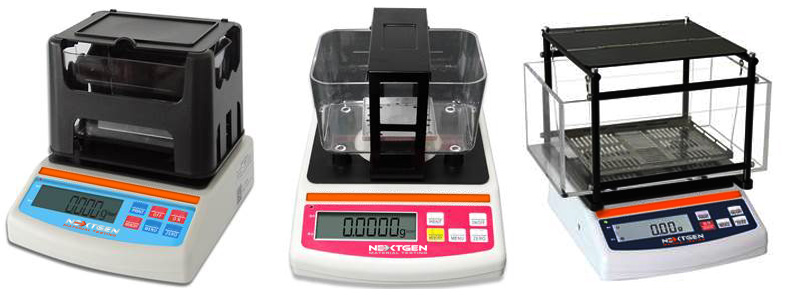
Digital Densimeter Systems
Description The NG-DM-A Series offers high-accuracy digital Densimeters designed for a wide variety of material testing needs. These elegant and compact densimeter systems offer capacity ranges from 150g to 3000g with accuracy of 0.001g/cm3 down to 0.0002g/cm3. Advanced Densimeter System […]
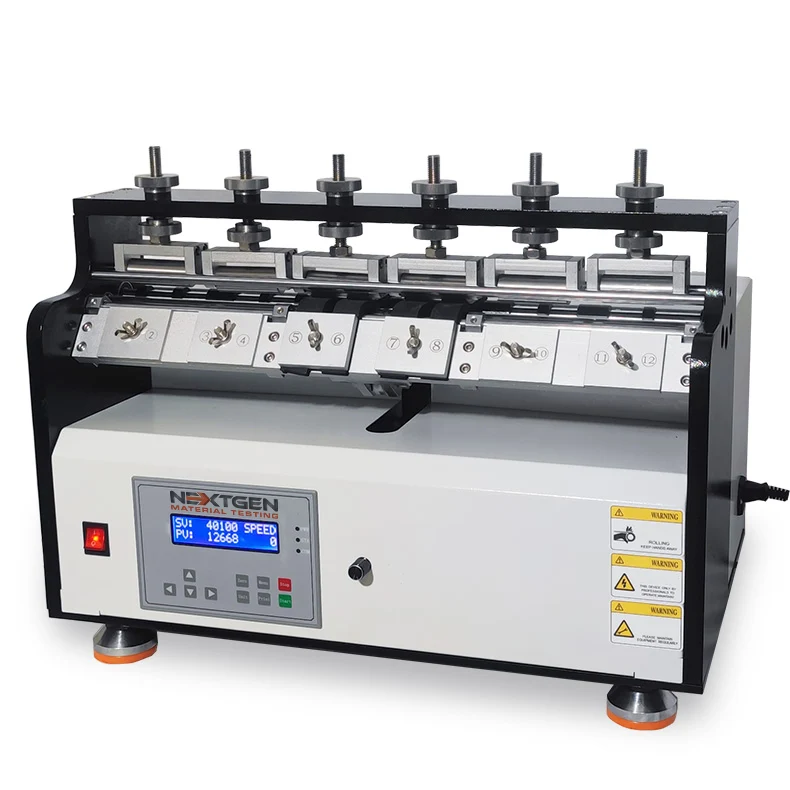
Ross Flex Tester
Ross Flex Tester is designed to determine the resistance of vulcanized or synthetic elastomers to cut growth. The system does so under continuously bend flexing in 90°.
